
They see Unkraut (bad weeds)...
... I see the peerless beauty of evolutionary success.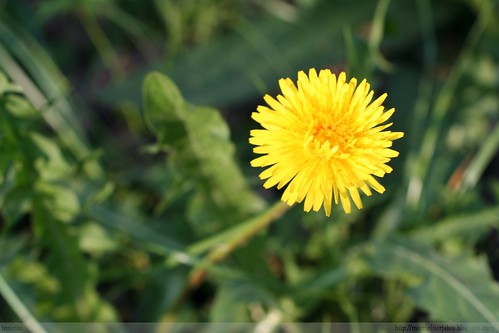
Monday, 27 April 2009
Thursday, 23 April 2009
Read in 2007/2008
Monday, 20 April 2009
Strange Nature
Sometimes Nature surprises us with scenarios seemingly taken from a horror film, for instance this tree, which is taking revenge on those who hammered a traffic sign into it, slowly but without a rest...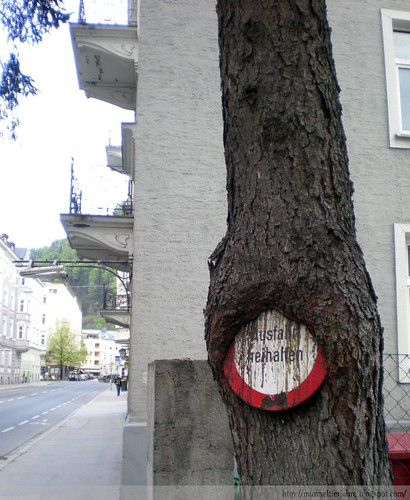
I happen to meet another such scenario, not as horrific but still quite surprising, in my way by the river from the office to the bus stop. At the side there are some maple trees. Last year I realised that one of them has an elder on top of it, don't really know how. I was able to spot it because elderflowers are quite easy to recognise, because of the looks and the smell. "Strange", I thought, "how did this fellow manage to grow up there?"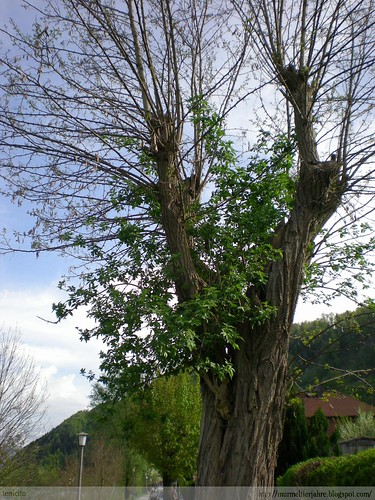
These last weeks I am observing the maple with an elder, and I've seen something interesting. All other maple trees at the pathway already have lots of leaves, green and well formed. But the one with the elder on top has just started putting out little shoots, while the elder not only has all of its leaves fully formed, but also has sprouted the first elderflowers.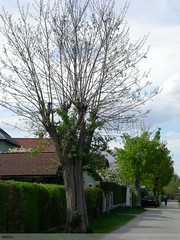
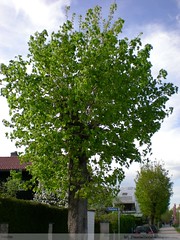
The maple with an elder (left) and a "normal" one (right). The latter has already lots of leaves, but on the former the only one with leaves on it is the elder!
That means, then, that the elder is, undoubtedly, a parasite of the maple tree. You'll never be too old to stop getting surprised...
Saturday, 11 April 2009
Apples
There's something interesting about fruit and vegetables and especially about the words we use for them. If you are asked to name a fruit really quickly, it would be not at all surprising if you think of an apple. Apples are like the quintessential fruits. Not only because they possess most of the features that we associate with fruit (round, coloured, it has a stem, ...), there is something about the word itself as well.
Many other fruits are named after apples, in many (European) languages. We've got the pineapple, the pomegranate (pomme being French for apple) or Granatapfel in German, there is Apfelsine in German for orange (probably because oranges come from China), we've got the Italian pomodoro (for tomato), which I would say means "golden apple". And do not forget one of my favourites: the French pomme de terre (potato), which means literally "ground apple" and has a nice direct translation in the Austrian local word Erdapfel. How did all these very different fruits and vegetables end up having such close words? 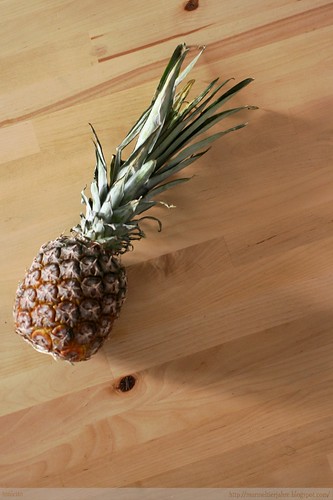
My theory is as follows. Centuries ago, as traders and explorers wandered around the world, they tried to bring something that would impress people back in Europe. Precious silk, unknown animals, rare spices and, of course, exotic fruit and vegetables. Now the problem with unknown stuff is that you have to come up with a name for it. What are your references when you have to name a new thing? Those things that you know and are familiar with. What is most familiar when you have find a name for a new fruit? Of course, the quintessential fruit: apples.
I would even say, people would use the word apple as a generic word for fruit, because at the very beginning, before traders and explorers started bringing strange stuff, there were mostly only apples. There might have been no actual distinction between fruit and apple, and the fact that we still use apples today to name that many other fruit and vegetables can be proof of that.
Can you think of other fruit whose name comes from apple?
Saturday, 4 April 2009
Conservationism
Lately I have found myself thinking and reading about life on our planet, about its first babbles, its current state and its future.
My awareness for conservationism has been shaped by readings and curiosity about the environment since my teenager years. But I think the true roots of this awareness, my realising the role we humans play about Nature, lay way back in the past, in my childhood, with two songs written by Joan Manuel Serrat, a Spanish Catalan singer that is part of the subconscious psyche of almost all members of my generation, thanks to our parents and the miracle of gramophone and compact cassette.
Pare digueu-me què li han fet al riu que ja no canta. Rellisca com un barb mort sota un pam d'escuma blanca. Pare que el riu ja no és el riu. Pare abans que torni l'estiu amagui tot el què és viu. Pare digueu-me què li han fet al bosc que no hi ha arbres. A l'hivern no tindrem foc, ni a l'estiu lloc on aturar-nos. Pare que el bosc ja no és el bosc. Pare abans de que es faci fosc tanquem la vida al rebost. Sense llenya i sense peixos, pare, ens caldrà cremar la barca, llaurar el blat entre les runes, pare, i tancar amb tres panys la casa, Ai, dèieu vostè... Pare si no hi ha pins no es fan pinyons ni cucs ni ocells. Pare si no hi ha flors no es fan abelles, cera ni mel. Pare que el camp ja no és el camp. Pare del cel avui ens plou sang. El vent ho canta plorant. Pare ja són aquí! Monstres de carn amb cucs de ferro. Pare no, no tingueu por, digueu que no, que jo us espero. Pare que estan matant la terra. Pare deixeu de plorar que ens han declarat la guerra. | Father, please tell me what have they done to the river that it doesn't sing anymore? It runs like a barbel dead under a handspan of white lather. Father, the river is not the river anymore. Father, before Summer comes again hide all that's alive. Father, please tell me what have they done to the woods that there are no trees? In winter we won't have fire, and in summer no place for us to rest. Father, the woods are not the woods anymore. Father, before it gets dark let us store life in the larder. Without firewood and without fish, father, we'll have to burn the boat, grow wheat among the rubble, father, and use three locks for the house, Oh, would you have said... Father, if there's no pine trees there'll be no nuts no worms, no birds. Father, if there's no flower there'll be no bees, no wax and no honey. Father, the fields are not the fields anymore. Father, it rains blood from the sky today. The wind sings about it crying. Father, they are here! Flesh monsters with their iron worms. Father, no, don't be afraid, and say no, I'm waiting for you. Father, they're killing the earth. Father, please stop crying because they've declared war on us. |
This sond, as I was saying, resides so deeply in my subconscious, so stuck in my soul, that big tears run down my cheeks every time I listen to it. The same happens with the next song, Plany al mar (Lament to the sea).
Bressol de vida, camins de somnis, pont de cultures, ai!, qui ho diria, que ha estat el mar? Mireu-lo fet una claveguera, mireu-lo anar i venir sense parar. Sembla mentida que en el seu ventre es fés la vida. Ai!, qui ho diria sense rubor? Mireu-lo fet una claveguera ferit de mort. De la manera que el desvalissen i l'enverinen, ai!, qui ho diria que ens dóna el pa? Mireu-lo fet una claveguera, mireu-lo anar i venir sense parar. On són els savis i els poderosos que s'anomenen ai!, qui ho diria, conservadors? Mireu-lo fet una claveguera ferit de mort. Quanta abundància, quanta bellesa, quanta energia, ai!, qui ho diria?, feta malbé. Per ignorància, per imprudència, per incosciència i per mala llet. Jo que volia que m'enterressin entre la platja, ai!, qui ho diria?, i el firmament. I serem nosaltres, ai!, qui ho diria? els qui t'enterrem. | Cradle of life, paths of dreams, bridge of cultures. Who would have thought it? That has been the sea. Look at it looking like a sewer. Look at it coming and going without stop. It's hard to believe that in its womb life was created. Who could now say that without a blush? Look at it looking like a sewer, fatally wounded. Looking at the way that it is stripped bare and poisoned, who could believe it gives us our bread? Look at it looking like a sewer. Look at it coming and going without stop. Where are the wise and the mighty ones that they call themselves, who would have thought, conservatives? Look at it looking like a sewer, fatally wounded. So much abundance, so much beauty so much energy, who would have thought?, totally ruined. Out of ignorance, out of imprudence, out of irresponsibility and out of meanness. I wanted to be buried between the beach, who would have though?, and the firmament. And it will be us, who would have thought?, the ones who'll have to bury you. |










 versión en español
versión en español






